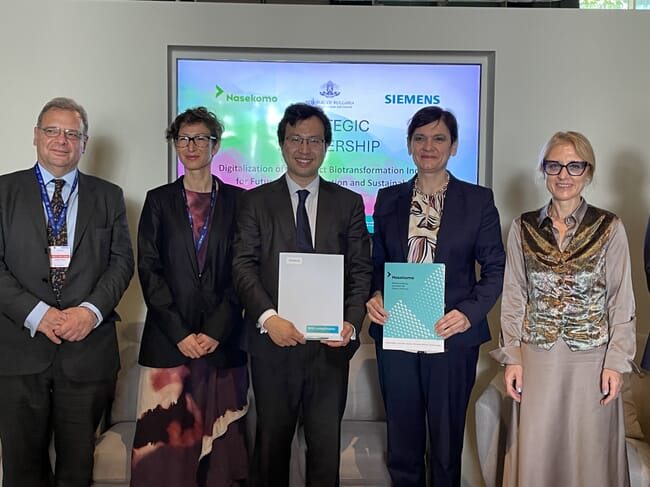
© Nasekomo
The partnership aims to bolster Nasekomo's development concept, which envisions creating a connected network of insect farms within European countries initially, and eventually expanding globally. The initial phase of collaboration will focus on establishing a state-of-the-art breeding centre to provide a sustainable supply of young insects for the network of farms.
The partnership between Siemens and Nasekomo, unveiled during the COP 28 conference, was confirmed in the presence of the Bulgarian minister of innovation and growth, Milena Stoicheva, and the minister of environment and water in Bulgaria, Julian Popov. The strategic cooperation document was signed by Virak Chhuor, vice president of engineering and production at Nasekomo, and Dr Boryana Manolova, CEO of Siemens for Bulgaria, North Macedonia and Ukraine.
Maria Alexandrova, head of innovative projects and sustainability at Nasekomo, stated: “Each facility within the network is planned to convert 100,000 tonnes of underutilised organic resources into 10,000 tonnes of valuable insect products, representing a tenfold increase in the value of the transformed biomass. The far-reaching impact of our entrepreneurial concept extends beyond economic metrics, as it is projected to counterbalance 100,000 tonnes of CO2 emissions annually, emphasising the significant environmental contribution of our transformative approach."
This concept not only envisions the automation of processes but also the digitalisation of all biological and technological operations within the breeding centre, achieved through machine learning and the implementation of cutting-edge technologies like digital twins for production and live insect larvae. With Siemens' support, Nasekomo aims to integrate systems and data from up to 200 planned production sites worldwide in the future. This will ensure intelligently managed operations, reliable AI analytics, and sustainable management.
Marc Bolard, co-founder and co-CEO of Nasekomo, added: "Biology is full of surprises, and by studying our insects in depth and tracking biological processes through machine learning, we can achieve much greater efficiency in managing them. Our strategy, based on four pillars – biology, technology, digitalisation and partnership – aims at strong cooperation with strong partners during the entire production process. We knew from the beginning that we could rely on Siemens for this purpose.”




